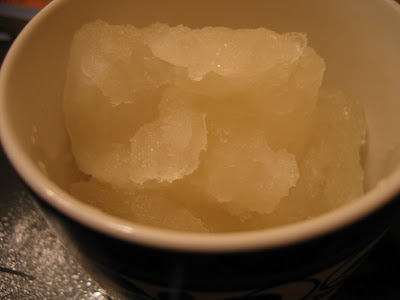Sometime in the summer, I woke up thinking about this wheat grinder that my parents had when I was younger. In my morning haze, I was wrapped up in memories of the sound of wheat berries popping down into the grinding blades, warm flour piling up in the metal bread pan resting below. I told my mom about my musings and she informed me that they still had the grinder and I was welcome to use it.
I drove down to my parents' house and rescued the grinder from the basement (and a hand-crank wheat grinder that we used for cracked wheat--my favorite breakfast food). Because I had new wheat grinding tools, I had to get wheat so I purchased a 50-lb bag. I immediately cracked some wheat for breakfast and ground some beautiful fluffy, nutty flour. Then, I set about baking bread.
I rarely bake bread. Growing up, our whole wheat was mainly used for waffles and pancakes (which my be why I had such good memories of the wheat grinder). I am not a break baking expert. I made a couple of transitional loaves and they worked fine, but with 50 lbs of wheat in the house, I really want to work with whole wheat. I made a stab at an entirely whole wheat loaf. It tasted fine, but it was so dense. A brick of chewy, dark bread. Not really what I was looking for. I found recipe for pumpkin whole wheat bread and that worked beautifully--the pumpkin made the bread creamier, lighter. But, I don't want to be throwing pumpkin into every loaf of bread I make.
My search for whole wheat bread recipes online were unsatisfactory, so I went to the bookstore hoping to find something that would change my baking life. The first think I saw on the shelves was Peter Reinhart's new
Whole Grain Breads. The book was beautiful, the directions were detialed, and the quotes on the back seemed enthusiastic (unlike those negative book blurbs!). It was a little pricey, but it
was birthday month. I bought it and looked at it for a couple of weeks before actually giving it a try.
So far, I have made a basic sandwhich loaf and cinnamon rolls. OMG. This is bread perfection. Reinhart uses a delayed fermentation method which includes making a biga and a soaker the day before shaping and baking. You have to plan ahead with this bread, but it is perfect. Light, soft, flavorful. The steps are many and a first look at the book suggests a complicated process, but it's quite easy. Reinhart gives measurements, weights, and baker's proportions so you can approach the bread with simplicity or a little more finesse (I went for the easy measurements and things worked fine). I think my next attemps will be challah and bagels.
If you have any bread baking ambitions, I highly recommend checking out this book. If you don't want to use whole grains, you may want to get his
Bread Baker's Apprentice. I actually haven't looked at it, but I can only imagine it's fabulous.
I may just get through that 50 pounds of wheat.
Labels: baking, bread, happiness
 My mother-in-law and sister-in-law and I had our annual candy-making extravaganza last weekend. This time we ended up with eleven different kinds, five of which were new to us:
My mother-in-law and sister-in-law and I had our annual candy-making extravaganza last weekend. This time we ended up with eleven different kinds, five of which were new to us: and pretzel wreaths:
and pretzel wreaths: I have never been much of a candy maker--anything that involves a thermometer and boiling sugar makes me nervous--but I'm getting good at melting white bark and pouring it over things like chow mein noodles and pretzels! And really, all truffles are is melted chocolate that gets gussied up.
I have never been much of a candy maker--anything that involves a thermometer and boiling sugar makes me nervous--but I'm getting good at melting white bark and pouring it over things like chow mein noodles and pretzels! And really, all truffles are is melted chocolate that gets gussied up.












